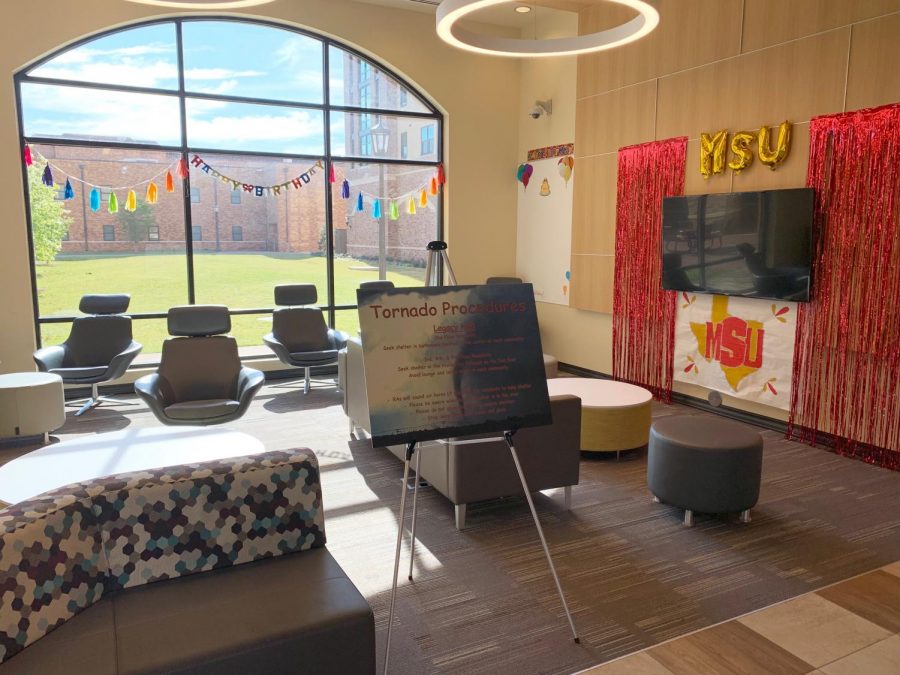Housing department keeps students safe through all natural disasters
Residence Life and Housing posted the Tornado procedures for residents of Legacy Hall in the lobby. Photo by Taylor Anderson
The housing department has planned detailed procedures for severe weather for students living in dorm halls and on-campus apartments.Residence Life and Housing Director Kristi Schulte encourage students to review the preparations and procedures in the Residence Life Handbook.
“All of our emergency procedures in our severe weather procedures are outlined in the Residence Life Handbook, which is available to students on our website. We encourage students to become familiar with that prior to arriving on campus. It’s a good way to not just understand the expectations in the halls but it does give a pretty good comprehensive overview of the safety and security measures that we have on campus,” Schulte said.
Students are also encouraged to get connected to the MSU Alert system and download the MSU Safety that is available on Apple and Android app stores.
“The importance is the remind students to download the MSU Safety app. A lot of severe warning will come out via the MSU Alert system. When students have access to that alert system and the safety app that has additional information, it’s one more tool that they have to stay safe and prepared on campus,” Schulte said.
Tornadoes
The risk of tornado damage in Wichita Falls is 154.15 higher than the United States average and 82.02 higher than Texas average. Tornadoes are most likely to occur between April and June, and small possibility in September. Since 1950 there has been one F4 in 1979, commonly known as Terrible Tuesday, one F5 in 1964 and three F3 in 1954, 1958 and 1962.
Procedures have been sent out to students via email and a poster of the steps are on display in the Legacy Hall lobby.
Samantha Manio, nursing freshman, lives in Sundance Court apartments and felt very safe to receive a notification via-email for the tornado procedures.
“It makes me feel safe, it’s good that they constantly remind the tenants of the apartments and dorms alike of the safety procedure. it keeps the students aware and feeling safe during times that would otherwise be scary,” Manio said.
Lauren Honeycutt, kinesiology freshman, lives in Legacy Hall and appreciates the poster posted in the lobby and also makes her feel safer knowing that they are there.
“Well I guess [the procedure board] it’s good that they have that to make us aware in times of emergency, and be educated on what to do if a tornado comes,” said Honeycutt.
All evacuations and procedures are reviewed at the beginning of the fall and spring semesters at the annual floor meetings. The housing department also performs an evacuation drill for students once a semester.
“Once a semester we also do an evacuation drill with students. We practice what it means to evacuate the building and where the meeting places are. Essentially the big thing for us, for students to evacuate the building in a calm and orderly fashion,” Schulte said.
Heat and drought
The average summer temperature in Wichita Falls in July is 97 degrees, and an average of 65.7% of the year are sunny days. The 1980 record of 48 days consecutive days of 100 degrees was broken in 2011 with 52 days.
The campus opens the Sunwatcher Village and Sundance Court apartments for the summer sessions and summer two is right in the middle of the hottest time of the year. Manio moved in early for the summer two sessions and was pleased with the way housing staff keeps personal thermostats in each room.
“In our apartments, there are thermostats that anyone staying in them can adjust based on personal preference which is super helpful, as well as fans in each individual room that you can adjust as well. I’ve never had any issue with the outside weather affecting the temperature in my apartment,” said Manio.
With the available personal thermostats in each room, there are hydration stations located all around campus, to help keep students hydrated.
“For students the best advice to keep a water bottle on them. There’s are many hydration stations around campus, so students can fill up their water bottle at those hydration stations and to make sure they are keeping many fluids in them,” Schulte said.
Honeycutt moved in early for summer two session and many times relied on the hydration station to keep her hydrated.
“I buy water bottles to keep in my room, but when I am going straight to class from morning workouts, the stations were always near to fill my bottle back up,” Honeycutt said.
From the personal thermostats to the hydration stations around campus, the housing department keeps works around the clock to students safe in all weather conditions. The department also works with the Maintenance Technicians to keep the air conditioning in all the rooms working.
“We have a team of maintenance technicians, who are on call and they are addressing heating and cooling issues as they come up. If we have a situation, where we have an air conditioning unit in an apartment go down, and we recognize that there is a high heat warning. We will do what we can to get those students in temporary housing until we can address the issues with their unit,” Schulte said.

G’day! I’m Taylor Anderson and I will be returning back to the Wichitan as the Sports Editor. I joined the Wichitan during my first semester at MSU...










